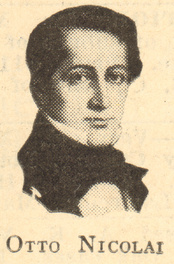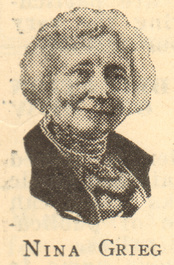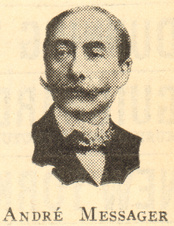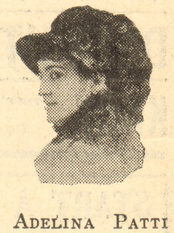Interesting and Important Items Gleaned in a Constant Watch on Happenings and Activities Pertaining to Things Musical Everywhere
 THE LITTLE THEATER OPERA COMPANY of New York and Brooklyn is reported to have given toward the close of the season a series of notable productions of opera in English, among which were Nicolai’s “Merry Wives of Windsor, ’ Biszet’s (sic) “Djamileh” and Bach’s only comedy opera, “Phoebus and Pan.” The organization has been mentioned as an American version of the Opéra Comique of Paris. Promising young singers are offered a chance to display their ability. Galli-Curci is among the patrons of the movement and has contributed generously from her operatic wardrobe.
THE LITTLE THEATER OPERA COMPANY of New York and Brooklyn is reported to have given toward the close of the season a series of notable productions of opera in English, among which were Nicolai’s “Merry Wives of Windsor, ’ Biszet’s (sic) “Djamileh” and Bach’s only comedy opera, “Phoebus and Pan.” The organization has been mentioned as an American version of the Opéra Comique of Paris. Promising young singers are offered a chance to display their ability. Galli-Curci is among the patrons of the movement and has contributed generously from her operatic wardrobe.
DAME NELLIE MELBA, now in England, has expressed her desire and intention to put all her energy and influence into Sir Thomas Beecham’s “League of Opera” project. With the business and artistic prestige of Sir Thomas and the popularity of Dame Melba, success for this movement, which should mean so much to musical England, would now seem assured.
MME. JULIE RIVE-KING, a great favorite of the last generation, and one of America’s first feminine pianists to win wide renown, gave a recital in Chicago, on February 27th. Now seventy-four years of age, her “charm and competency” enabled her to excite “as keen a stir as in the flush of her career.”
A DEBUSSY MEMORIAL CONCERT was given at Amsterdam, on January twenty-eighth, under the auspices of the Holland Committee. The receipts, nearly twenty-nine thousand francs, were deposited at the French Legation, to be added to the fund being raised in Paris for the erection of a monument to the composer. A similar festival in Buenos Aires recently contributed forty thousand francs to this fund.
IN THE TEXAS COMPOSERS’ CONTEST for the one thousand dollar prize offered by the Composers’ Club of San Antonio, the award has been divided between the co-winners, Carl Venth of Fort Worth and Mrs. Harwood Stacy of Austin. The judges were Alberto Bimboni, Ernest Schelling and Boris Levenson.
DR. ADOLPH BRODSKY, principal of the Royal Manchester College of Music, England, since 1895, died there in January. Born at Tanarog, Russia, in 1851, he claimed Tschaikowsky as a personal friend. Dr. Brodsky came to the United States in 1890 to become leader of the Damrosch Symphony Society, which post he held till his going to Manchester.
 WIDOWS OF TWO FAMOUS NINETEENTH-CENTURY composers still survive. Mme. Nina Grieg, herself once an eminent pianist, who is now eighty- three years of age, participated about a year ago in a concert of her famous husband’s compositions, on the twentieth anniversary of his death. Cosima Wagner was ninety-one in January and now lives a quietly retired life at Bayreuth. Noted for her forceful will, it is mostly by her influence that the widely- known Bayreuth Festivals are still continued largley (sic) as a family organization and event, as was Wagner’s wish.
WIDOWS OF TWO FAMOUS NINETEENTH-CENTURY composers still survive. Mme. Nina Grieg, herself once an eminent pianist, who is now eighty- three years of age, participated about a year ago in a concert of her famous husband’s compositions, on the twentieth anniversary of his death. Cosima Wagner was ninety-one in January and now lives a quietly retired life at Bayreuth. Noted for her forceful will, it is mostly by her influence that the widely- known Bayreuth Festivals are still continued largley (sic) as a family organization and event, as was Wagner’s wish.
JULIUS VAN BEETHOVEN, a great-great nephew of the composer and the last of the family relatives bearing that illustrious name, is reported to have died recently in Vienna.
ARTHUR MIDDLETON, one of the best known of America’s concert and oratorio baritones, who had sung important roles with both the Chicago and Metropolitan opera companies, died in Chicago, on February 16, at the age of forty-eight.
THE UNITED STATES ARMY BAND sailed on April 10th, for a series of sixty concerts in various countries of Europe, besides a special engagement at the Exposition at Seville. Music of the composers of all the American nations will be featured on the programs.
M. RHENÉ-BATON, the eminent French conductor, of Paris, led on February the sixteenth a grand concert in Berlin devoted entirely to the works of French and Russian composers.
THE BACH CANTATA CLUB of London, with the Right Reverend Lord Bishop of Oxford as president, and C. Kennedy-Scott as conductor, has given a chamber performance of the “B minor Mass.” A program of three of the secular cantatas was sung at the Royal Academy of Music on February 12th.
THE ROYAL BELGIAN BAND, known as “La Musique des Guides,” landed in New York on March 18th, for a three months “good-will” tour of the United States and Canada, under the immediate patronage of King Albert. An amusing incident of the pre-arrival of the organization was a mid-ocean radiogram from Captain Arthur Prevost, conductor of the band, thanking the command of the American Army for the offer of cavalry horses for their parade to New York City Hall, but declining with the explanation: “Unfortunately your American horses do not speak French; and our musicians are naturally accustomed to giving all their commands to their mounts in the French language.”
A CONFERENCE OF ENGLISH-SPEAKING MUSICIANS is to be held at Lausanne, Switzerland, during the first week of August. It is an outgrowth of the “Field Day for Music Educationists, British and American,” which was held in London on July 7, 1928. Particulars may he had by addressing “Music Conference Registrar,” 2 Albany Courtyard, Piccadilly, London, W. 1, England; or, 70 Fifth Avenue, New York City.
MOZART’S “DON GIOVANNI,” often mentioned as “the masterpiece among operas,” is announced for a revival by the Metropolitan Opera Company early in the next season. Ezio Pinza is to have the title role, with Pavel Ludikar as Leporello, Beniamino Gigli as Don Ottavio, Rosa Ponselle as Donna Anna, Elizabeth Rethberg as Donna Elvira and Lucrezia Bori as Zerlina. The Metropolitan Company has given this all-star opera with many notable casts including such names as Nordica, Sembrich, Eames, Gadski, Scotti, Bonci, Chaliapin and Plancon.
THE COLLEGE OF ST. NICHOLAS, named for the patron saint of choristers, and especially of choir-boys, has been established at Chiselhurst, Kent, just out of London, England. It has been endowed as a center for the training of church musicians. Dr. Sidney H. Nicholson about a year ago resigned his position as organist of Westminster Abbey in order to devote his time to the development and leadership of the school.
ENGELBERT HUMPERDINCK’S HOME, at Boppart, Germany, has been purchased by the government to be remodeled and devoted to the uses of a museum of mementoes of the master.
TIlE GUILD OF OPERATIC ARTS has been organized in New York, with the purpose of “preparing in America, American artists for Grand Opera,” for the encouragement of the performance of opera in English and to assist in the development of our American composers of opera.
THE SEVENTH ST. CECILIA FESTIVAL was held at the Queen’s Hall of London, on February ninth. The chorus of five hundred women’s voices was drawn from I.ondon Girls’ Clubs, with Mr. Harvey Grace as conductor.
THE SOUTH CAROLINA STATE MUSIC TEACHERS’ ASSOCIATION, with William C. Mayfarth as president, met for its eighth annual convention, at Spartansburg, on February 25th. Among the speakers were Mrs. Crosby Adams, Frederick W. Wodell and James H. Hope, State Superintendent of Education.
HARRISON WILD, for thirty years conductor of the famous Apollo Club of Chicago, and since 1895 leader of the Mendelssohn Club of that city, died suddenly at his home, late in February. He had resigned leadership of the Apollo Club about three years ago, because of increased loss of hearing. Mr. Wild was probably the most widely known pupil of Clarence Eddy, and he had held positions as organist in several leading churches of the city, as well as having been at one time official organist of the Auditorium.
THE EASTERN MUSIC SUPERVISORS CONFERENCE met in the Benjamin Franklin Hotel of Philadelphia, on March 13th to 15th. Leading speakers were : M. Claude Rosenberry, on “Extension of Equal Opportunities for music to all children;” Russell Carter, on “Better Preparation for Better Teaching of Better Music;” George H. Gartlan, on “Songs and Choral Music;” Victor. L. F. Rebmann, on “Instruments and instrumental Music;” Jacob Kwalwasser, on “Some Changes that would Result in a Better Balanced Program;” H. S. Wilder, on “Piano Classes;” and James Francis Cooke, on “Musical Conditions Abroad.” Leading organizations furnishing musical entertainment at the meetings were: Cass Township Consolidated School Boys Chorus, under Miss Mary Muldowny; The Philadelphia Musical Fund Ensemble in a Chamber Music program; Girard College Band, under George O. Frey; Girard College Junior Hundred (Boys’ Chorus), under Bruce A. Carey; Temple University women’s Glee Club, under Minerva M. Bennett; and a recital on the great Wanamaker Organ by Charles M. Courboin, with Thaddeus Rich as Violin Soloist, and the Choral Art Society with Harry Alexander Matthews as conductor.
TOSCANINI’S THIRTIETH ANNIVERSARY as a conductor at La Scala was celebrated by the inauguration of a “Foundation Toscanini” for giving assistance in the education of children of the people connected with that opera house. In response to an appeal by the Mayor, a large sum was contributed by the Milanese. In connection with the celebration, the society which maintains the museum of the theater published a history of La Scala for the century and a half from 1778 to 1928.
OSSIP GABRILOWITSCH, while conducting as “guest” his spring season of concerts with the Philadelphia Orchestra, found himself without a soloist for the B-flat Piano Concerto of Brahms, when Horowitz was suddenly taken ill. Rather than change the program, the assistant Conductor, Artur Rodzinski was called for duty with the baton and Gabrilowitsch took his place at the piano and gave an inspiring reading of the soloist’s score.
 ANDRÉ MESSAGER, the eminent French composer, best known in America by his “Mme. Chrysanthème, ” died in Paris on April 25th, at the age of seventy-five. He began his career as a church organist and was appointed to St. Sulpice in 1874. In 1880 he became conductor of the Eden Theater of Brussels and from that time turned his attention almost entirely to operatic composition and conducting. He had held positions in Paris, at the Opéra Comique, the Opéra and as conductor of the Conservatoire concerts; and for a time he was artistic director of the Covent Garden Opera House of London.
ANDRÉ MESSAGER, the eminent French composer, best known in America by his “Mme. Chrysanthème, ” died in Paris on April 25th, at the age of seventy-five. He began his career as a church organist and was appointed to St. Sulpice in 1874. In 1880 he became conductor of the Eden Theater of Brussels and from that time turned his attention almost entirely to operatic composition and conducting. He had held positions in Paris, at the Opéra Comique, the Opéra and as conductor of the Conservatoire concerts; and for a time he was artistic director of the Covent Garden Opera House of London.
SCHUBERT’S “ERL KING,” in manuscript, was recently sold at auction in Berlin, for five thousand dollars—probably more money than the unfortunate composer saw in his entire life. The manuscript of his Vergiss Mein Nicht brought $775; Chopin’s Polonaise in A-flat Major, for piano, brought $2,250; Mendelssohn’s Forty- Second Psalm, $600 ; Beethoven’s Der Mann vom Wort, $495 ; and a letter from Mozart to his father, $225.
S. WESLEY SEARS, organist of St. James’ Protestant Episcopal Church, and one of the most gifted and popular of Philadelphia organists, died from a short illness, on March 7th. He was a pupil of Widor, the eminent French organist, and of Sir Frederick Bridge who so long held the post at Westminster Abbey.
THE MUSICAL CENTER OF AMERICA has been declared to be Laporte, Indiana, by a survey of the entire country recently taken. Nine per cent of the 15,158 inhabitants of Laporte are regular attendants upon musical events. The same statistics show that but four per cent of our general population attend concerts and recitals. Of the metropolitan centers, Chicago, and New York, less than one per cent of the population attend concerts.
FERNANDES ARBOS takes about seventy-five of the players of the Madrid Symphony Orchestra each year on a tour of Spain. Towns of even four thousand inhabitants or less are visited in all parts of the country, the audiences being sometimes mostly peasants. Bach is reported to be the favorite composer, perhaps because of the rhythmic force and virility of his music. Under Senor Arbos’ inspiring leadership the Madrid Symphony Orchestra; has risen to a place of eminence among European musical organizations.
 THE AUDITORIUM, so long the social and musical center of Chicago, heard, on January 26th, its last performance by the Chicago Civic Opera Company. The opera was Gounod’s “Romeo et Juliette,” which had opened the first season in the Auditorium, forty years ago, with Patti and a bevy of Italian singers in the cast; and for the closing event the leading roles were interpreted by two American artists, Edith Mason and Charles Hackett. At the opening of the next season the Chicago Civic Opera Company will go to the new home specially built for it on Wacker Drive.
THE AUDITORIUM, so long the social and musical center of Chicago, heard, on January 26th, its last performance by the Chicago Civic Opera Company. The opera was Gounod’s “Romeo et Juliette,” which had opened the first season in the Auditorium, forty years ago, with Patti and a bevy of Italian singers in the cast; and for the closing event the leading roles were interpreted by two American artists, Edith Mason and Charles Hackett. At the opening of the next season the Chicago Civic Opera Company will go to the new home specially built for it on Wacker Drive.
PIETRO MASCAGNI, known throughout the musical world for his “Cavalleria Rusticana” was admitted on January 30th, to membership in the Royal Academy of San Luca in Rome. This “academy” is composed of the most eminent men in science, art, music, literature and government.



